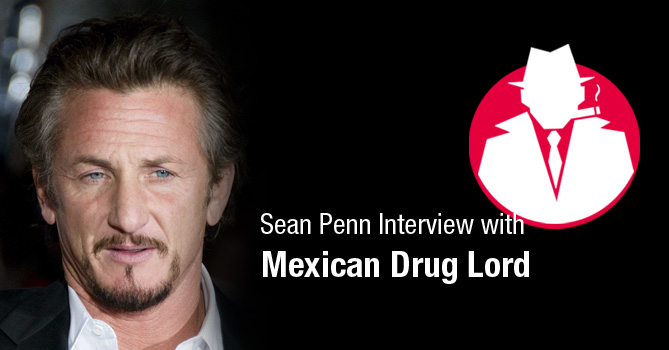Here’s a story that would make Don Corleone (Godfather) look like a midget. A Mexican drug lord, who has been literally calling the shots in entire Mexico and America when it comes to drug trafficking, has occupied public imagination like no one else. In fact, it was a moment of epiphany for the world when it woke up to the news of this drug lord being interviewed by Hollywood actor Sean Penn in a jungle somewhere in Mexico. You know it’s not a midsummer night’s dream when the Mexican authorities claimed that the meeting between the actor and the drug kingpin Joaquin Guzman in October 2015 helped officials in tracking him and recapturing him on January 8 during a military operation in Sinaloa State.
How was the Interview Fixed?
This “clandestine horror show”, as described by Penn himself, had its origin in the drug lord expressing his desire to see the story of his life being told through a motion picture. As it turned out, the man would trust none but Kate del Castillo – a Mexican film and television star – who had once expressed a rather sympathetic view of El Chapo (a short guy), the more popular name of Joaquin Guzman. In a series of developments, Penn met Kate at a Santa Monica restaurant and convinced her to be “the bridge” between the interviewer and the interviewee.
The idea, which was further thought upon on a “gorgeous fall day in New York City”, was followed by weeks of clandestine planning to interview Guzman, a man with whom Penn didn’t feel any “sense of anchored commonality.” What transpired after a 14-hour journey from Los Angeles and “a seven-hour sit-down” has been revealed through a 10,000-word article in Rolling Stones magazine. The world came to know about the man’s “indisputable charisma” and how “entirely unapologetic” he was about his status as a drug dealer only a day after he was recaptured.
The Clandestine Approach
Interviewing one of the most wanted fugitives in the world was no child’s play and the stakeholders of Rolling Stones were aware of the pitfalls. From reporting to editing, every process had to be completed without attracting the attention of the authorities. In the words of Mr. Jann Wenner, the founder of the magazine, “I did not want to provide the details that would be responsible for his capture. We were very conscientious on our end and on Sean’s end, keeping it quiet, using a separate protected part of our server for emails.”
The magazine was prepared to resist any sort of pressure from the US and Mexico to get insights into Guzman’s whereabouts. Despite the risk involved, Sean Penn went ahead and negotiated with Guzman’s intermediaries about including the drug lord’s video as an essential component of the interview. These developments took place as recent as the Thanksgiving Day in 2015.
The Journey of a Drug lord
Guzman is no less fascinating than a figure firmly rooted in Mexican folklore. The story of his life is much more gripping than that of Frank Abagnale Jr. and even several times more exciting than the Wolf of Wall Street. He is no ordinary conman or a drug peddler. He got into drug trade early in his life and his rise has been rapid. From establishing the Sinaloa cartel to pioneering the use of tunnels to ship products and evade capture, the 57-year-old has done it all.
The interview in Rolling Stones quoted him saying, “I supply more heroin, cocaine and marijuana than anybody else in the world. I have a fleet of submarines, airplanes, trucks, and boats.” In the same breadth he was believed to have said that there was no other way and “there still isn’t a way to survive, no way to work in our economy to be able to make a living.”
The Chicago Crime Commission may have declared him ‘Public Enemy Number One’ but there is a certain Robin Hood that resides within him. He is credited for bringing the basic services to the Sinaloa Mountains and sponsoring development projects.
Criticism for Sean Penn and Rolling Stones
Sean Penn may have been ‘chummy’ with Hugo Chavez and a ‘darling’ of leading leftist leaders in Latin America, but his secret visit to Mexican drug lord in the latter’s hideaway did raise heckles with the US. His Rolling Stone interview has been slammed as “overly sympathetic” toward the notorious criminal. The fact that Sean Penn had sought approval from the drug kingpin before the interview is enough to believe, as some critics say, that Penn had written a more pro-Guzman story and omitted “unflattering facts” so that the article didn’t get rejected.
While a White House spokesman may describe the interview as “maddening” and a Republican Marco Rubio Senator can call it “grotesque”, Penn had been subtle in his mission statement. The actor had dealt with the humanitarian crisis in Haiti. He knows the futility of theoretical solutions proposed by bureaucratic agencies that are cut off from the ground reality. He also blames it on the “tunnel vision of our puritanical” culture that lost sight of rationality while launching the War on Drugs. He sees his efforts as a legitimate journalism that aims at knowing the other side of the story that doesn’t find a mention in journals and gray literature.

